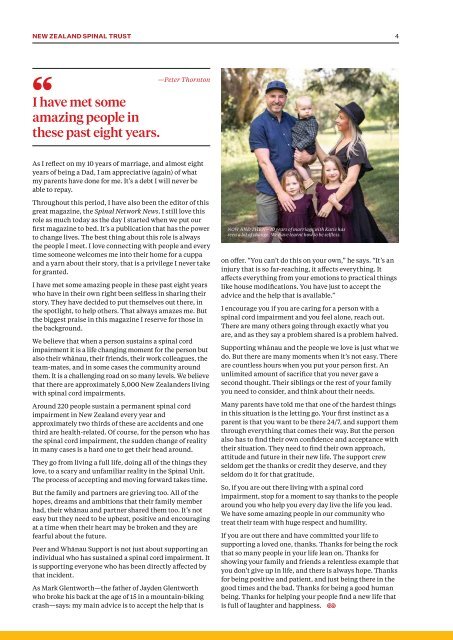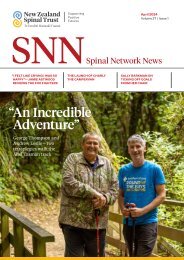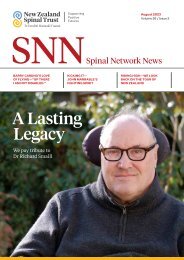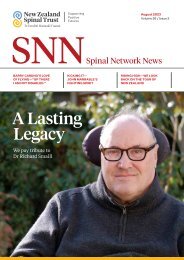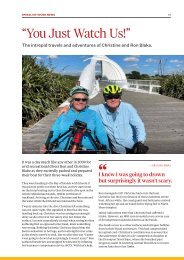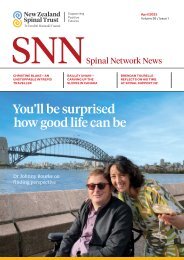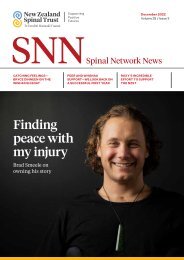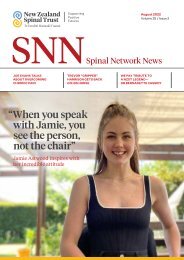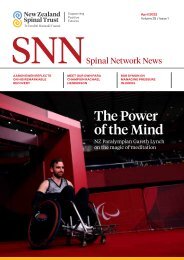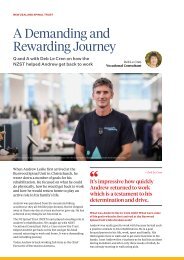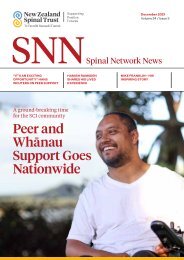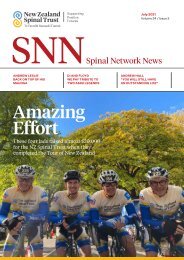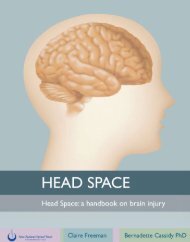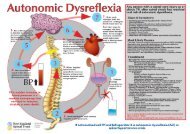You also want an ePaper? Increase the reach of your titles
YUMPU automatically turns print PDFs into web optimized ePapers that Google loves.
NEW ZEALAND SPINAL TRUST 4<br />
I have met some<br />
amazing people in<br />
these past eight years.<br />
—Peter Thornton<br />
As I reflect on my 10 years of marriage, and almost eight<br />
years of being a Dad, I am appreciative (again) of what<br />
my parents have done for me. It’s a debt I will never be<br />
able to repay.<br />
Throughout this period, I have also been the editor of this<br />
great magazine, the Spinal Network News. I still love this<br />
role as much today as the day I started when we put our<br />
first magazine to bed. It’s a publication that has the power<br />
to change lives. The best thing about this role is always<br />
the people I meet. I love connecting with people and every<br />
time someone welcomes me into their home for a cuppa<br />
and a yarn about their story, that is a privilege I never take<br />
for granted.<br />
I have met some amazing people in these past eight years<br />
who have in their own right been selfless in sharing their<br />
story. They have decided to put themselves out there, in<br />
the spotlight, to help others. That always amazes me. But<br />
the biggest praise in this magazine I reserve for those in<br />
the background.<br />
We believe that when a person sustains a spinal cord<br />
impairment it is a life changing moment for the person but<br />
also their whānau, their friends, their work colleagues, the<br />
team-mates, and in some cases the community around<br />
them. It is a challenging road on so many levels. We believe<br />
that there are approximately 5,000 New Zealanders living<br />
with spinal cord impairments.<br />
Around 220 people sustain a permanent spinal cord<br />
impairment in New Zealand every year and<br />
approximately two thirds of these are accidents and one<br />
third are health-related. Of course, for the person who has<br />
the spinal cord impairment, the sudden change of reality<br />
in many cases is a hard one to get their head around.<br />
They go from living a full life, doing all of the things they<br />
love, to a scary and unfamiliar reality in the Spinal Unit.<br />
The process of accepting and moving forward takes time.<br />
But the family and partners are grieving too. All of the<br />
hopes, dreams and ambitions that their family member<br />
had, their whānau and partner shared them too. It’s not<br />
easy but they need to be upbeat, positive and encouraging<br />
at a time when their heart may be broken and they are<br />
fearful about the future.<br />
Peer and Whānau Support is not just about supporting an<br />
individual who has sustained a spinal cord impairment. It<br />
is supporting everyone who has been directly affected by<br />
that incident.<br />
As Mark Glentworth—the father of Jayden Glentworth<br />
who broke his back at the age of 15 in a mountain-biking<br />
crash—says: my main advice is to accept the help that is<br />
NOW AND THEN—10 years of marriage with Katie has<br />
seen a lot of change. We have learnt how to be selfless.<br />
on offer. “You can’t do this on your own,” he says. “It’s an<br />
injury that is so far-reaching, it affects everything. It<br />
affects everything from your emotions to practical things<br />
like house modifications. You have just to accept the<br />
advice and the help that is available.”<br />
I encourage you if you are caring for a person with a<br />
spinal cord impairment and you feel alone, reach out.<br />
There are many others going through exactly what you<br />
are, and as they say a problem shared is a problem halved.<br />
Supporting whānau and the people we love is just what we<br />
do. But there are many moments when it’s not easy. There<br />
are countless hours when you put your person first. An<br />
unlimited amount of sacrifice that you never gave a<br />
second thought. Their siblings or the rest of your family<br />
you need to consider, and think about their needs.<br />
Many parents have told me that one of the hardest things<br />
in this situation is the letting go. Your first instinct as a<br />
parent is that you want to be there 24/7, and support them<br />
through everything that comes their way. But the person<br />
also has to find their own confidence and acceptance with<br />
their situation. They need to find their own approach,<br />
attitude and future in their new life. The support crew<br />
seldom get the thanks or credit they deserve, and they<br />
seldom do it for that gratitude.<br />
So, if you are out there living with a spinal cord<br />
impairment, stop for a moment to say thanks to the people<br />
around you who help you every day live the life you lead.<br />
We have some amazing people in our community who<br />
treat their team with huge respect and humility.<br />
If you are out there and have committed your life to<br />
supporting a loved one, thanks. Thanks for being the rock<br />
that so many people in your life lean on. Thanks for<br />
showing your family and friends a relentless example that<br />
you don’t give up in life, and there is always hope. Thanks<br />
for being positive and patient, and just being there in the<br />
good times and the bad. Thanks for being a good human<br />
being. Thanks for helping your people find a new life that<br />
is full of laughter and happiness.


